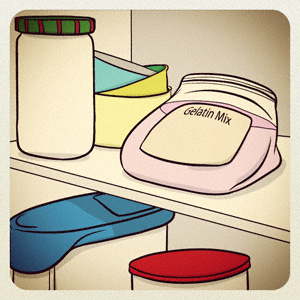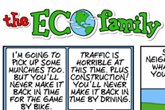- Home
- Comics
- Green Blog
-
Resources
Other Resources
-
Connect
Frugal Is Part Of Living Green
One of my favourite books is The Complete Tightwad Gazette by the Amy Dacyczyn - The Frugal Zealot. (http://www.amazon.ca/The-Complete-Tightwad-Gazette-Dacyczyn/dp/0375752250)
In it are thousands of little ideas for how a family can save money. Not every idea is for everybody, but what it does more than anything is get you into the mind-set of thinking about how you are spending your money and what you can do to reuse or repurpose what you already have. Also simply how to not spend money when you don’t have to.

With a large family, believe me there are thousands of ways to spend money, and groceries is a big one. We try to mitigate the costs by not buying a lot of prepared foods, and by being conscientious when it comes to using electricity or gas. Certainly, I’m not willing to give up some of my conveniences like using an electric mixer instead of a hand beater, but I still have one in my drawer. It never hurts to bring it out now and then to remind me that generations of families survived very well without having the latest and greatest appliances on their countertops.
I’ve read the book probably a dozen times or more and it never fails to inspire me, especially when I’m feeling like the little things don’t matter. In fact, it’s the little things that matter the most when it comes to being frugal. My King tells me stories of how his parents always could find a second use for almost everything. They never purchased disposable anything, including paper towels or disposable dishes. Jars were always washed out and reused for canning or for saving leftovers in the fridge. Plastics could be reused as containers for almost anything. To this day, Mother Eco’s pantry is always stocked with an assortment of containers for any use.

Now that things are not coming in glass jars any more, I’m finding more and more people are starting to save the ones they have. I think people are starting to realize that some of the things we used to take for granted that will always be readily available for free soon will not be there any more. I’m glad I have an assortment of gallon jars that work so well in my pantry for clear storage of my rice, pastas and lentils. Smaller quart and pint size jars also useful for any number of things that I buy in bulk, and also keep it safe from bugs or mice. I like clear glass especially because it allows you to see exactly what is inside the jar, and how much you have.
Buying things when they are on sale certainly saves money, but you have to be able to afford not to buy something when it isn’t on sale. That means it’s a good idea to keep enough stock of things you need on hand to be able to wait until they come on sale the next time. You also have to balance keeping a stock with not having more of something on hand than you can use before it expires. I make a habit of rotating my stock every time I buy new, so the oldest comes to the front.

Also buying in bulk can save a lot of money. For instance, my family loves jello. It’s inexpensive and easy to make and there are a lot of different ways you can prepare it. If you buy it in individual packages, it’s slightly more convenient to have it all pre-measured but you pay a premium for that extra packaging. You can buy it in a bulk bag that gives you nearly 4 times the product for the same price as the individual packages. I suppose if you wanted to be really efficient, when you got the big bag you could pre-measure the mix into baggies in the quantity that you normally use, but I just put in a 1/2 cup scoop that I can measure out what I need as I need it.
One of the oldest no-fail tips is to shop with a list. The only exception I make to that is if there is something I use regularly that comes on sale. To make a list, it’s best to make a menu. I try to shop once a week so I make a week’s menu at a time and then make sure I have the ingredients I need either in my pantry or on my shopping list. Having a pre-made menu really takes the stress out of trying to put something together on the fly and also makes the meal-making so much easier. I have a whiteboard in the kitchen with the meals for the week written on it. That way if I’m not home on time to start the meal, someone else can get things going. Also, by making a menu ahead of time, you can plan in some bulk cooking to make use of leftovers. For example, I might cook double potatoes one night in order to have potato salad the next. I even cook my eggs on top of the potatoes so they are ready to go as well. Saves both time and electricity.
Blog Category:
Environmental Choices

















